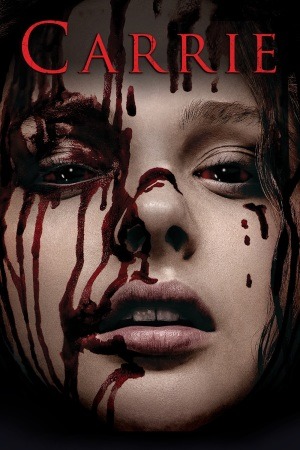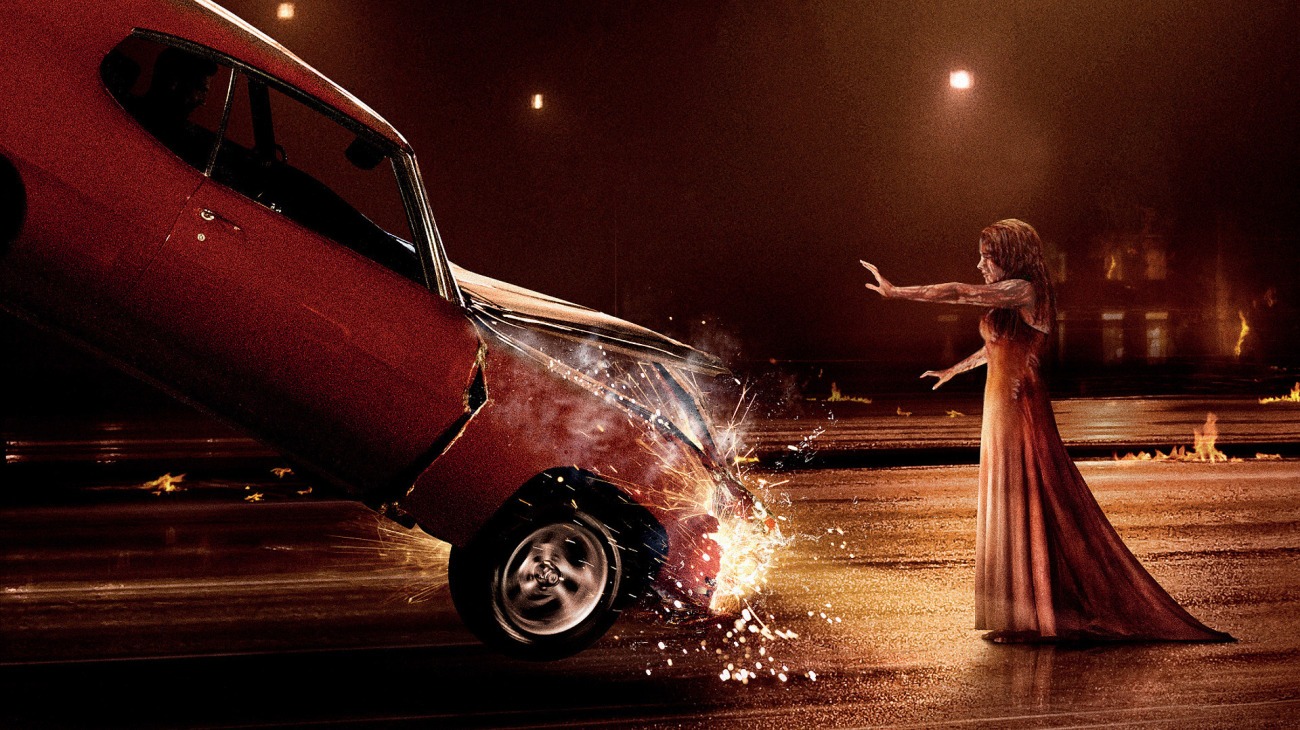
A bloody disaster
If the new Carrie teaches us anything, it's the importance of casting. I don't know if it's "officially" more of a new adaptation of Stephen King's 1974 debut novel, or more of a remake of the Brian De Palma-directed 1976 classic, but nobody could be stupid enough to suppose that people in the audience aren't going to be mentally making every comparison between that film and this that could possibly be made. And the first and most important point to compare is Carrie White herself: Sissy Spacek's performance is one of the legendary turns in horror cinema, as can be readily appreciated even by somebody like myself, no real fan of that movie. The role calls for a dysfunctionally awkward outsider whose awareness of human behavior and social code is provisional and hastily kludged together; Spacek, who in her youth possessed one of the oddest faces in cinema, slid right into that perfectly. It seemed genuinely probable that she was just as alienated as the script claimed, simply because of how apart Spacek could make herself seem just by projecting the right parts of her angular body. It is masterful, mesmerising stuff.
The new Carrie is played by Chloë Grace Moretz, and I can't think of a worse choice out of all the established actresses in the right age range. Everything that is burned into the character - uncertainty, ignorance, innocence, fear, the inability to fit in - is directly the opposite of everything that Moretz brings to any and every significant performance she's even over the last few years, and though she puts in an extreme effort to play the part like it's been written, it's just that - effort. Extreme effort. Moretz tries her absolute goddamn best to put Carrie over the way that writer Roberto Aguirre-Sacas, dressing up the 1976 version by Lawrence D.Cohen, wrote her, and every bit of the acting process is plainly revealed on her face, which never looks like anything but a contorted death mask until the blood-spattered prom night finale, the one point were the film significantly deviates from earlier movie. And not to its benefit - if Spacek's Carrie exploded in an uncontained fit of rage and humiliation, Moretz's Carrie is making conscious, deliberate choices about who revenge herself on, and visibly enjoying it. Which alters the themes of the story to the point of uselessness.
At which point somebody might well trot out "but it's a different movie!" And the fact of the matter is: no, it's not. It's the same movie, hitting virtually all of the same beats, frequently using functionally identical camera set-ups. If there is any meaningful change to speak of, it's because the new Carrie assumes that it has a much less intelligent audience, one that cannot deal with shaded characterisations, and so requires every member of the cast to be predictable, from their first scene, as a Good person or a Mean person. And the film's prologue, in which Carrie's mother Margaret (a shockingly ineffective Julianne Moore) gives birth to her unwanted daughter, and nearly kills the infant in a fit of religious mania. As though we needed more proof than the story amply provides that Margaret is loony, and has a profoundly unhealthy relationship with her daughter.
That a remake of Carrie should turn out to be a pathetic retread of the same emotions, step-by-step, executed with far less skill and visceral punch is probably to be expected, I guess, though I wasn't really prepared for how entirely lifeless the new film would be at every step. That it is this pathetic and bland while being directed by Kimberly Peirce is confusing as hell. All along, it seemed easy to assume that Peirce, she who directed no less a study of gender roles and physical desire than Boys Don't Cry, was going to make some sort of arch-feminist Carrie, or a Carrie that found bolder ways to elaborate on the theme of pubescence and sexual awakening. Metaphorical sexual awakening is the freebie, with Carrie. So damn me if Peirce didn't end up making a film less involved in female sexuality than De Palma did; the shades and implied complexities involved in Carrie's feelings towards boys are left to one scene and basically one single shot, and that's it for sexualised themes. That and the famous menstruation opening scene, which I must give Peirce credit for: it's been handled with far more sympathy and openness than in the first film, where there was, however buried underneath style and the baroque action, a tendril of "ew, gross, periods!"
So no hardcore feminist reimagining; what, then, justifies this Carrie? The answer, I am certain is nothing. Other than a few intolerably obvious suggestions about how life in the iPhone Age changes the nature of bullying (Carrie's tampon hell is uploaded to YouTube - oh, and 2007 called, it wanted its plot point back), the story isn't upgraded to 2013 convincingly, the characters aren't likeable or interesting, there's not a single scary beat in the entire thing, and the prom scene has been turned into an indistinguishable clone of a battle scene from just about any superhero movie. It's one thing for the movie to be weaker than the '76 Carrie; this goes deeper than that. There is absolutely nothing of value in this movie; it makes boring and arbitrary things that legitimately worked in at least two separate mediums already (three if you're the weirdo who likes the Carrie stage musical). It's a film where the unabashed highlight is Judy Greer as a thoughtful and sympathetic gym teacher, and all the love in the world to Ms. Greer, whose presence has enlivened so many things, but you don't want her to do all the heavy lifting for your movie. Ever.
Everything here is surface-level and unengaged with the characters or emotions; and those surfaces are already pretty bland and hackish and sanitary. Medicore and useless, I had expected of this Carrie; grating, soul-deadening insipidity I had not, and this is about as insipid as modern horror is able to be.
2/10
The new Carrie is played by Chloë Grace Moretz, and I can't think of a worse choice out of all the established actresses in the right age range. Everything that is burned into the character - uncertainty, ignorance, innocence, fear, the inability to fit in - is directly the opposite of everything that Moretz brings to any and every significant performance she's even over the last few years, and though she puts in an extreme effort to play the part like it's been written, it's just that - effort. Extreme effort. Moretz tries her absolute goddamn best to put Carrie over the way that writer Roberto Aguirre-Sacas, dressing up the 1976 version by Lawrence D.Cohen, wrote her, and every bit of the acting process is plainly revealed on her face, which never looks like anything but a contorted death mask until the blood-spattered prom night finale, the one point were the film significantly deviates from earlier movie. And not to its benefit - if Spacek's Carrie exploded in an uncontained fit of rage and humiliation, Moretz's Carrie is making conscious, deliberate choices about who revenge herself on, and visibly enjoying it. Which alters the themes of the story to the point of uselessness.
At which point somebody might well trot out "but it's a different movie!" And the fact of the matter is: no, it's not. It's the same movie, hitting virtually all of the same beats, frequently using functionally identical camera set-ups. If there is any meaningful change to speak of, it's because the new Carrie assumes that it has a much less intelligent audience, one that cannot deal with shaded characterisations, and so requires every member of the cast to be predictable, from their first scene, as a Good person or a Mean person. And the film's prologue, in which Carrie's mother Margaret (a shockingly ineffective Julianne Moore) gives birth to her unwanted daughter, and nearly kills the infant in a fit of religious mania. As though we needed more proof than the story amply provides that Margaret is loony, and has a profoundly unhealthy relationship with her daughter.
That a remake of Carrie should turn out to be a pathetic retread of the same emotions, step-by-step, executed with far less skill and visceral punch is probably to be expected, I guess, though I wasn't really prepared for how entirely lifeless the new film would be at every step. That it is this pathetic and bland while being directed by Kimberly Peirce is confusing as hell. All along, it seemed easy to assume that Peirce, she who directed no less a study of gender roles and physical desire than Boys Don't Cry, was going to make some sort of arch-feminist Carrie, or a Carrie that found bolder ways to elaborate on the theme of pubescence and sexual awakening. Metaphorical sexual awakening is the freebie, with Carrie. So damn me if Peirce didn't end up making a film less involved in female sexuality than De Palma did; the shades and implied complexities involved in Carrie's feelings towards boys are left to one scene and basically one single shot, and that's it for sexualised themes. That and the famous menstruation opening scene, which I must give Peirce credit for: it's been handled with far more sympathy and openness than in the first film, where there was, however buried underneath style and the baroque action, a tendril of "ew, gross, periods!"
So no hardcore feminist reimagining; what, then, justifies this Carrie? The answer, I am certain is nothing. Other than a few intolerably obvious suggestions about how life in the iPhone Age changes the nature of bullying (Carrie's tampon hell is uploaded to YouTube - oh, and 2007 called, it wanted its plot point back), the story isn't upgraded to 2013 convincingly, the characters aren't likeable or interesting, there's not a single scary beat in the entire thing, and the prom scene has been turned into an indistinguishable clone of a battle scene from just about any superhero movie. It's one thing for the movie to be weaker than the '76 Carrie; this goes deeper than that. There is absolutely nothing of value in this movie; it makes boring and arbitrary things that legitimately worked in at least two separate mediums already (three if you're the weirdo who likes the Carrie stage musical). It's a film where the unabashed highlight is Judy Greer as a thoughtful and sympathetic gym teacher, and all the love in the world to Ms. Greer, whose presence has enlivened so many things, but you don't want her to do all the heavy lifting for your movie. Ever.
Everything here is surface-level and unengaged with the characters or emotions; and those surfaces are already pretty bland and hackish and sanitary. Medicore and useless, I had expected of this Carrie; grating, soul-deadening insipidity I had not, and this is about as insipid as modern horror is able to be.
2/10






